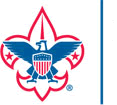Trail To Eagle

The advancement program can be divided into three, sometimes overlapping and not easily separated, parts:
- Basic scout skills: These include such skills as camping, cooking, first aid, physical fitness, and swimming. These basic scoutcraft skills are the ones a scout must master in his progression from Scout through First Class ranks.
- Merit badge program: There are over one hundred widely diverse merit badges offered by the boy scout program. In his advancement from First Class through Eagle rank, a scout must complete 21 of these badges; of these, twelve are specified by the Boy Scout program, leaving nine others which the scout can choose from among the hundred-plus that are available. Click Here to View the Merit Badge List.
- Personal growth/character development: Throughout his scouting experience (and the rest of his life, we hope), a scout is expected to live in accordance with the Scout Oath and Scout Law. He and his scoutmaster periodically review the scout’s “scout spirit”; as one of the last steps before completing any rank, a scout must have a “scoutmaster’s conference” during which the scoutmaster reviews the scout’s compliance with the requirements of the Scout Oath and Scout Law.
Teaching staff: There are three sets of teachers in the boy scout program:
- Older scouts: The more experienced scouts (usually those who are at least first class rank) in the troop and at long term BSA camps teach the basic scoutcraft skills to the scouts who are still working on tenderfoot through first class ranks. This instruction is an integral part of the troop meetings. (Swimming requirements are the notable exception – the instruction and test are administered under the supervision of a certified lifeguard.)
- Adult scouters provide the role models for the scouts, by exemplifying the Scout Oath and Scout Law in their personal lives. At least two of these adult scouters, including at least one member of the scoutmaster corps, are present at all scout functions; they are available as leaders, teachers, and support/resource personnel for the older scout instructors.
- Merit badge counselors are adults in the community and surrounding area who have volunteered to share their expertise in a particular subject with interested scouts. Merit badge counselors are as carefully chosen and screened as is any other adult scouter (see Handbook section “Organization”). Note: All troop 111 merit badge counselors must be approved by the Conestoga District advancement chairman; also, BSA regulations specify that no individual may be a counselor for more than six merit badges.
Teaching forums: Whenever a boy and an adult are together, be it at home, in school or church, or in a meeting such as a scout troop meeting, teaching/learning takes place. In this sense, any time there is a scout function, the scouts are learning from other scouts and from the two or more scouters present. More formal teaching/learning forums include a merit badge counselor’s home or office (with, of course, another adult present); a troop meeting to which a merit badge counselor is invited by the patrol leader’s council (normally, to teach an eagle-required merit badge); summer camp, which provides an opportunity for younger scouts to complete most of their scoutcraft skills, and older boys to work on outdoor oriented merit badges such as ornithology and mammal study; any troop campout. Scout’s responsibility: The primary responsibility for his advancement rests with the individual scout. The troop committee includes an advancement chairman who will counsel scouts who are not advancing at a reasonable pace; however, it is up to the individual scout to seek out instruction in scoutcraft skills from older scouts (or scouters, if necessary), and to contact merit badge counselors. Any scouter will gladly help any scout who asks for help; however, the onus is on the scout, not the scouter. Parent responsibility: There are at least two ways in which a parent can help a scout on the trail to eagle scout rank:
- Encouragement: Boys take their cues from the adults who are close to them. If the parent is interested in the scout’s progress, in the scout’s activities, and in the troop generally, and lets the scout know this by question and encouragement, the scout will tend to give a higher priority to scouting than to some of the other demands on his time.
- Involvement: If a parent feels that scouting is sufficiently important to lay claim to part of his time, the scout will give increased importance and prominence to scouting in his active schedule. This involvement may be no more than attending courts of honor and providing transportation to and from campouts and other scout events; it may involve active work on the troop committee; it may involve helping at summer camp or on the high adventure trips; it may involve becoming a member of the scoutmaster’s corps. It is a matter of record not only nationally, but more importantly here in troop 111, that almost every scout who has achieved eagle rank has had a parent actively involved with the troop (unfortunately, the reverse is not always true: not every parent who is involved with the troop ends up with an eagle scout son).


